|
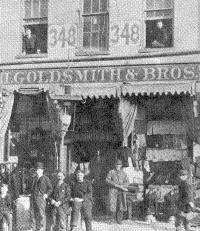 |
|
 |
|
I. Goldsmith & Bros. on
Beale |
Goldsmith's
Logo and store |
The
Goldsmith Building today. |
|
|
|
|
 |
 |
 |
 |
 |
|
Goldsmith's Restaurant |
1909
Postcard |
1910
Tri-State |
Goldsmith's Santa |
Goldsmith's 1925 |
|
|
|
 |
 |
 |
 |
 |
|
Goldsmith Brothers -1953 |
Enchanted Forest |
Santa |
GoldThrift
Accnt |
Employee 5 yr Pin |
|
|
|
|
|
|
 |
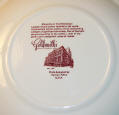 |
 |
 |
 |
| Souvenir Plate
- Red |
Souvenir
Plate - Back |
Souvenir
Plate - Blue |
Souvenir
Plate - Back |
Golden G Pin |
|
| |
|
 |
|
Goldsmith's -
Half-Yardstick |
| |
 |
 |
 |
 |
 |
 |
| Souvenir Plate
|
Plate Back |
1969 Ad |
Hatbox-Vintage |
Matchbook |
G.Pressley Charge
Card |
|
| |
| |
 |
 |
 |
 |
 |
 |
|
Goldsmith
|
Sheet Music |
Geo Hamilton
1963 |
Prints -
Gift Shop |
Prints -
Gift Shop |
Prints -
Back |
|
| |
|
|
|
|
 |
 |
 |
 |
 |
 |
 |
|
<
1914 Goldsmith's Dinner at the Gayoso > |
Matchbook |
1920
Golden Jubilee Dinner at Scottish Rite Cathedral |
|
| |
 |
 |
 |
 |
 |
 |
| 1930 Catalog |
1908 Ad |
65th Anniversary |
75th
Anniversary |
Vintage
Postcard |
Goldsmith
Label |
|
| |
|
|
| |
|
|
| |
| |
|
|
Lowenstein's
Department Store
- 64-68 N. Main . 89 N. Main
. 99 N. Main . 27 S. Main |
| |
|
Elias Lowenstein emigrated to Memphis in 1854. The firm which
he headed, B. Lowenstein and Bros. Department Store, was Prominent in
Memphis for 125 years. Their store at 26 Main was a classic
cast-iron building. In 1924 Lowenstein's built a large building
on the site of the old Main Street Peabody at 27 S. Main. This building was
renovated in 1987 and renamed Brinkley Plaza. In 1956 Lowenstein's purchased Bry's
at 99 N. Main. In
1962-64 they demolished the Bry's building and built Lowenstein's
Tower. Today the Renaissance Apartments Tower occupies
this site. Lowenstein's closed and liquidated in 1981.
When Lowenstein's vacated
the "old Lowenstein" building in the 20s, the old building
was taken over by Rhodes-Jennings Furniture Co. They moved out in
1980 and the old building sat vacant for almost three decades.
With terra cotta
angels and a cast-iron facade, the store, built in 1886, was threatened with demolition in 1996. Three
developers—John Basek, C. Yorke Lawson, and William Chandler, then
president of Memphis Heritage—united in 2000 and eventually saved the
National Register-listed building with a $20 million renovation. Now
home to 28 apartments and retail space, the Lowenstein is part of a
three-building project called Court Square Center.
On Mar.
18, 2009, 500 people in Memphis attended the grand opening of the newly
renovated Lowenstein Building.
"It's the building that nobody said
could be saved, and it's got new life again," says June West,
executive director of Memphis Heritage, which owned the easement that
protected the building's facade and has contributed $35,000 over the
years to save the Lowenstein. "It's one of those projects that you
wait for all your life. Now I get to say to people, 'Don't give up."
|
| |
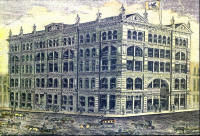 |
 |
 |
 |
|
Old Lowenstein
Building
|
Lowenstein
Building today |
Renovated
Building 2017 |
Lowenstein-Brinkley Plaza |
|
|
|
Elias Lowenstein
was a leader in the Memphis Jewish community. He served as
president of Temple Isreal for 15 years. He contributed liberally to
rebuilding the city after the disastrous 1870's yellow fever
epidemics. In 1891 Elias Lowenstein built a mansion which was Memphis' most important Victorian Romanesque residence and one of the
finest of its styles in the South. After his death in 1919, his family
donated it to the Nineteenth Century Club for use as a residence for
young working women who did not have family in the city and,
therefore, under social customs of the day were expected to live in a
protected environment. A porch with cupola was removed in 1929 for construction of an annex. |
 |
|
|
Elias Lowenstein House |
|
|
 |
| |
|
The Lowenstein Building
|
|
 |
 |
|
1884 Invoice |
Ad
from 1865 Memphis Directory |
| |
|
|
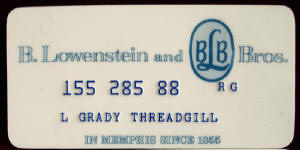 |
 |
 |
 |
|
Lowenstein Credit Card |
1927
Letter
|
1930 Candy |
Candy Label |
|
|
|
|
|
|
|
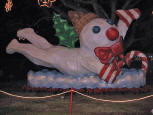 |
 |
 |
 |
 |
|
Mr. Bingle |
Santa - 1956 |
Souvenir
Plate |
Souvenir
Plate - Back |
Elias
Lowensteins |
| |
|
|
|
|
 |
 |
 |
 |
 |
|
B. Lowenstein |
1907-Decorated |
1930s Card |
1926 |
1878 check to Lowenstein's for
$444 signed by Jefferson Davis |
|
|
|
|
 |
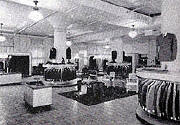 |
 |
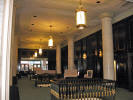 |
 |
|
Lowenstein's interior |
Lowenstein's interior |
Brinkley
Plaza - interior |
Brinkley
Plaza - interior |
1903 Ad
|
|
|
| |
 |
 |
 |
 |
 |
 |
| 1890 Billhead |
1896 Invoice |
1871
Article |
Hat Box |
Vintage Hat |
Matchbook |
|
| |
|
|
| |
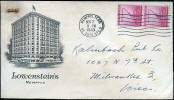 |
|
|
 |
|
1943 Envelope |
|
|
1909 Postcard |
|
| |
|
|
|
|
Bry's
Department Store
- 89 N. Main at Jefferson
|
|
|
|
In 1902, the store, founded by Nathan and Louis Bry, and
I. D. "Ike" Block,
opened at the SE
corner of Main & Adams. Ike Block took over management of
the store at the outset since his partners were also operating Bry
Brothers - a wholesale firm in St. Louis.
In 1905
they moved to a new store at Main and Jefferson, where they competed successfully for over
fifty years with Lowenstein's, Gerber's, and Goldsmith's.
Bry's was noted for its annual "Daring Sale" in which it dropped
prices and doubled the number of clerks. In 1912, Bry's
enterned the history books when it became the first store to sell
sheet music written by W. C. Handy. This was also the first
store to use ladies as clerks. Bry's anchored North Main and
Goldsmith's anchored South Main. In 1956 Bry's was sold to
Lowenstein's and closed in 1964. |
|
|
 |
 |
 |
 |
|
Bry's - 1918
|
Bry's Postcard |
Bry's - building enlarged |
Shoe Hook
|
|
| |
|
|
|
 |
 |
 |
 |
 |
 |
|
Bry's first
store- Main and Adams |
Bry's
Employee Button |
Bry's
Ad
1924 |
1924 Ad |
Bry's Ad |
Bry's Spoon |
|
|
|
|
|
|
 |
 |
 |
 |
 |
|
 |
|
Louis Bry Obit |
|
 |
|
|
I. D. "Ike" Block |
I.D. Block
c.1925 |
Nathan Bry |
Louis Bry |
Mellie-Louis
Bry |
Nathan Bry
Obit |
|
|
|
|
|
 |
 |
 |
 |
 |
|
Bry's Ad - 1918 |
Bry's 1919 |
Rare Santa
Button |
Bry's 1909 |
Bry's 1914 |
|
|
|
 |
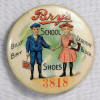 |
 |
 |
 |
|
Bry's 1940 |
Bry's
Badge-1920s |
Bry's Front
Street 1910 |
Vintage
Button |
Vintage
Button |
|
|
|
|
|
|
|
Gerber's
Department Store
- 25 North Main
|
|
|
|
John
Gerber opened his first store in 1880 and expanded greatly over
the years - eventually taking up most of the block. s installed Memphis’
first escalators and they opened to
great fanfare and free publicity in the two newspapers for the
store. The first escalators had been planned by Goldsmith’s but Gerber's quietly installed theirs about 6 months ahead of
Goldsmiths.
Gerber's was particularly noted for its TEA ROOM - a popular
meeting place downtown.
When retailers began to abandon Main Street in the 1960s, Gerber's
struggled to stay. But after going through two fires in 1968
and 1971, the store was doomed. The store closed October 15,
1974 and the building was demolished in the mid 1980s. A
hotel stands on the site today.
|
|
|
 |
 |
 |
|
Gerber's
|
Gerber's - 1926 |
Gerbers Ad
-1946
|
|
|
|
 |
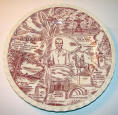 |
 |
 |
 |
|
Gerber's Christmas - 1937 |
Souvenir
Plate |
Plate -
Back |
Chas
Gerber |
Gerber's
Interior 1880s |
|
|
|
 |
 |
 |
 |
 |
|
Gerber's
Windows |
Postcard
1950s |
Charles
Gerber |
Obit |
Gerber
Tribute |
|
|
|
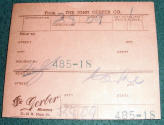 |
 |
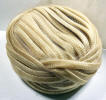 |
 |
 |
 |
|
1930s Sales Receipt |
Shoes |
Vintage Hat |
1st Gerber on Main |
Gerbers Tea
Room |
Patio Rest.
1956 |
|
|
|
|
|
|
|
|
|
Kress
- 7 North Main . 80 S. Main |
| |
|
The Kress building is easily recognizable by its
colorful and decorative terra-cotta facade. Kress opened the first,
in what was to become a nationwide chain of five-and-dime stores, in
Memphis in 1896 and moved to the Main Street location in 1927.
In 1980, the Kress Store became McCrory's and the store
finally closed in 1994. Conscious of the historical significance of the building, the new
owners have restored the structure in accordance within historical
guidelines and have adapted it and adjoining buildings for use as a hotel
- Spring Hill
Suites by Marriott.
 |
Samuel Henry Kress (1863 - 1955) was one of seven children of
a Pennsylvania coal-mining supervisor. Originally a
Pennsylvania schoolteacher, he opened a stationery and notions
shop in Memphis in 1887. This grew into the nationwide
chain S. H. Kress & Company. Kress would eventually own
about 400 stores, including nine in Florida. A
businessman and philanthropist, he was an art lover and with
his fortune, amassed one of the most significant collections
of Italian Renaissance and European artwork assembled in the
20th century. In 1929 he established the Kress
Foundation to sponsor traveling exhibitions, scholarships in
art history, and restorations of monuments in Italy. He
also donated a significant portion of his art collection to
Brooks Memorial Art Gallery. |
| Samuel
Kress |
|
|
| |
 |
 |
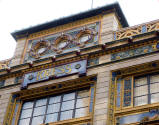 |
 |
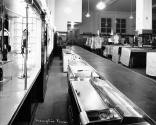 |
|
Kress -Vintage |
Kress -
Detail |
Detail on the building |
Kress -80 S. Main |
Lunch Counter 1950s |
|
|
|
|
|
|
|
|
|
|
W. T.
GRANT - 113 S. Main at Gayoso |
| |
|
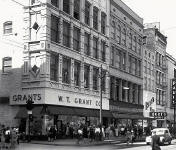 |
 |
 |
 |
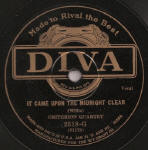 |
|
W. T. Grant |
Building being renovated |
W. T. Grant |
GGrant
Ad |
Grant Record Brand |
|
|
|
|
W. T. Grant,
or Grants was a chain of United States-based
mass-merchandise stores. The stores were generally of
the "dime store" format located in downtowns.
The Grant store in Memphis closed in 1976. The
building has now been converted to luxury lofts. At its
peak there were 1200 Grant stores nationwide.
William Thomas Grant (1876-1972) was the founder of the W. T.
Grant stores. He began his career by selling flower
seeds, and as a young man, developed his philosophy:
sell people what they need at prices they can afford, making
only a modest profit.
Grant dedicated much of his life and fortune to philanthropic
efforts, though after his death his stores folded in the
biggest retail bankruptcy in history. The W. T. Grant
Foundation, due to diversification, survived and continues his
philanthropy. |
|
|
|
|
|
|
|
|
|
Black &
White Store -
Busy Bee - Shainberg's
-
122 S. Main |
|
|
 |
 |
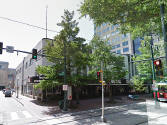 |
|
Black and White Store - 1948 |
2011 |
2011 |
|
| |
|
When
Daniel Lewis first opened
this store in 1905, it was named the
Black and White Store
and it was next door to Brys. Later the store moved to
the building across from Goldsmiths and remodeled with the
distinctive black and white tiles. When Lewis's daughter
married Sam Shainberg, he took over the store's management.
In the mid 1950's, the name was changed to Shainberg's to upgrade
the image of the business and to recognize its new owner.
The old store on Main became Jolly Royal Furniture in 1978. (In 2017,
the black and white tiled building was still standing on S. Main
and the now Royal Furniture is still there). |
|
| |
 |
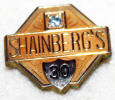 |
 |
 |
 |
| Blk-Whiie
next to Bry's |
30th
Anniversary |
Shainberg's |
Matchbook |
Shainberg's Logo |
|
|
|
|
|
|
Greener's
Department Store -
Harris Department Store
308 - 12 Beale |
|
|
 |
 |
 |
 |
|
Greener's 1954 |
Greener's |
1937
- "Jug Bands" |
Harris
Depart. Store - c 1960s |
| |
|
|
|
|
|
Greener's Department Store opened here in 1928. It was
generally considered to be a mirror- image of Schwab's Department
Store further down Beale. It operated from this location for
30 years before it became the Harris Department Store in the early
1960s. Today the building houses the Pat O'Brien night club. |
|
|
|
|
|
|
|
|
|
|
Credits |
|
|
|
The
Historic-Memphis website does not intentionally post copyrighted
photos and material without permission or credit.
On
occasion a "non-credited" photo might possibly be posted because we
were unable to find a name to give credit. Because of the nature of
our non-commercial, non-profit, educational website, we strongly
believe that these photos would be considered "Fair Use. We have
certainly made no monetary gain, although those using this website
for historic or Genealogy research have certainly profited. If by
chance,
we have posted your copyrighted photo, please contact us, and we'll
remove it immediately, or we'll add your credit if that's your
choice. In the past, we have found that many photographers
volunteer to have their works included on these pages and we'll
also do that if you contact us with a photo that fits a particular
page. |
|
|
|
The "Historic-Memphis" website would like to acknowledge and thank the
following for their contributions which helped make this website
possible: Memphis
Public Library, Memphis University Library, Memphis Law Library,
Memphis Commercial Appeal, Memphis Press Scimitar, Shelby County
Register of Deeds, Memphis City Schools, Memphis Business Men's
Club, Memphis Chamber of Commerce, Memphis City Park Commission,
Memphis Film Commission, Carnival Memphis, Memphis Historical
Railroad Page, Memphis Heritage Inc, Beale Street Historic District,
Cobblestone Historic District, Memphis Historic Districts, Vance
Lauderdale Family Archives, Tennessee State Archives, Library of
Congress, Kemmons Wilson Family, Richard S. Brashier, Lee Askew,
George Whitworth, Woody Savage and many individuals whose assistance is
acknowledged on the pages of their contributions. Special
thanks to Memphis Realtor, Joe Spake, for giving us carte blanche
access to his outstanding collection of contemporary Memphis photos.
We do not have high definition copies of the photos on these
pages. If anyone wishes to secure high definition photos,
you'll have to contact the photographer or the collector.
(To avoid any possibility of contributing to SPAM, we do not
maintain a file of email addresses for anyone who contacts us). |
|
|
|









































































































































































